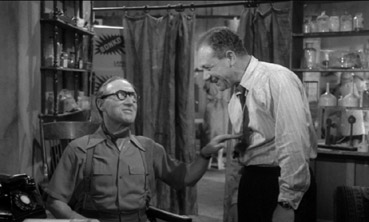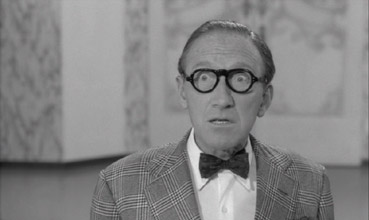|
Times
change and tastes change with them, and there are few places where
this more evident than feature films designed
to capitalise on the popularity of a comedy talent who has
made their name in another medium. I'm tempted to further
narrow this down to British films and British comedians,
but just recently I re-watched Wayne's World and
was startled by how awkwardly out-of-date some of it
now seems, particularly its recycling of
catch-phrases from the original TV spots, incorporated only because fans of the TV version expected them to
be there. We all laughed at the time, but a few years down the
line and divorced from the skits on Saturday Night
Live it's a bit like watching two school kids giggling
at jokes only they understand the humour of. The Bohemian
Rhapsody sequence is still a scream, but then that
was not lifted from the TV show but created specifically
for the film. It's a good film gag, well executed. A wide-eyed, grin-at-the-camera
exclamation of "Schwing!" is not.
Being British myself, it's hard not to be particularly sensitive
to what happens when British TV and stand-up comedians are
stuck in front of a film camera and expected to recreate
their comedy personas on an inappropriate new canvas.
It took two features to convince everyone that Morecambe
and Wise should stick to television, and just one to assure us that
George and Mildred, the Are You
Being Served? gang and the trio from Man
About the House should never be let out of the
living room. Even some of the better transitions from small to
big screen – Porridge and Dad's
Army come to mind – tend to feel like extended
TV specials rather than legitimate feature fare.

Music-hall
(that's the UK equivalent of vaudeville for American readers)
and radio acts of the 30s and 40s were particularly ripe
for feature film repackaging in their day, their audience
pretty much guaranteed until TV came a long to spoil the
party. The music-hall comedy style is one that has proved
all too specific to its time and place, with appreciation of
the cheeky chappie suggestiveness and wink-at-the-audience
approach practiced by some of its more prominent stars the sort of
stuff that practically defines the generation gap today.
Music hall was already ancient history by the time I began discovering
my comedy heroes and I thus encountered its
practitioners in curious retrospect, my age and the changing times
making it nigh-on impossible for me to appreciate its appeal.
This was comedy my father and grandfather was raised on
and was lost on me. There were exceptions. Will Hay in particular
not only struck me as a genuinely funny man, but was someone
who successfully made the transition from stage to film.
Arthur Askey, on the other hand, I just didn't get. His
success was undeniable, and in his day I'm sure he had them
rolling in the aisles, but watching Arthur do his stuff
now is, for me at least, like watching history – it may
be interesting, culturally significant even, but it sure
ain't that funny. For those old enough to appreciate the
man's talent and skill I apologise, but will offer in my
defence the fact that I'm not the only one left bemused – The
Fast Show's music-hall bore Arthur Atkinson is
modelled very specifically on Askey, right down to his appearance
and distinctive delivery.
Make
Mine a Million was clearly designed as
a vehicle for Arthur and his particular approach to comedy, but
it's nonetheless a valid inclusion in Optimum's Sid
James Collection, given that James here gets
a rare star billing right after Askey, his name
printed in letters almost as large. That he plays second
fiddle in plot terms to Arthur's naïve hopeful is inevitable,
but it's a measure of Sid's enduring appeal that he almost
steals the film from under Arthur's nose. Watching James
at work here you can start to see why Tony Hancock apprently saw him
as a threat to his own popularity.
OK,
some plot. Daffy, accident-prone TV makeup man Arthur dreams
of having his own show and likes to pretend that he's a
big name in the industry. A chance meeting with dodgy but
ambitious barrow boy Sid results in him and young cameraman
Jack (Bernard Cribbins) becoming involved in a scheme to hijack broadcast
airtime to hock Sid's product, a new detergent called Bonko.
The stunt loses Arthur his job but makes Bonko a household
name, attracting the interest of companies wanting their
products advertised in similar fashion.
This
is unlikely but familiar little man against the system fluff
– you'll have no trouble predicting how it all ends –
but by way of a then topical and sometimes inventive dig
at the silver screen's arch enemy, television, with equal shots
aimed at the BBC (here the National Television Corporation,
whose board of directors are all stuffy disapproval and
staunch traditionalism) and the newly launched ITV (labelled
simply The Commercial and run
by brash young upstarts). The influence and power of TV
advertising also gets a poke in the ribs, with Sid initially
unable to sell Bonko to a distrustful public or even
the local laundrette because "it hasn't been advertised
on the telly." All of which is rather fun, and at that
time the cartoonish stereotyping to the TV execs may well
have been closer to the truth than it now seems.

But
the satirical always takes second place to Arthur's clowning,
and that's going to be the thing that either wins you over
or gets right up your hooter. I had little trouble pitching
my tent in the latter camp. For Askey fans I'd suggest this
might prove a minor treat, and for those familiar with the
stars of the period there are even brief cameos by the likes
of Tommy Trinder, Evelyn Laye, Dickie Henderson and Sabrina
to savour. But for the rest of us it's a bit of a slog,
a somewhat dated trip down comedy's memory lane (the laundry
whites/black woman joke in particular is a painful reflection of outdated attitudes), but made intermittently watchable by its shameless
and amusing TV baiting, Lance Comfort's brisk direction,
and Sid James in full blown dodgy geezer mode.
An
anamorphic picture framed 1.76:1, which I am not sure is
the original aspect ratio – the IMDb suggests 1.37:1, but
there are certainly no tight framing issues. The transfer
here is very good one, with contrast and sharpness as good
as a fair few recent films and hardly a dust spot or compression
artefact in sight. There is a very slight wobble at the
end of some dissolves, but otherwise a fine job.
The
Dolby 2.0 mono soundtrack is clean and clear, though there's
a slight hum in one of the quieter early scenes. No major
problems otherwise.
None,
not even a little biography of our Arthur.
Star
vehicles of this sort required an appreciation of the performer's
comedy style, and with Mr. Askey I'm afraid I don't just
have it. For his fans I have no trouble recommending Make
Mine a Million – it's well enough made, busily
paced, has a decent supporting cast and looks good on DVD.
The rest of you would be advised to proceed with caution.
|